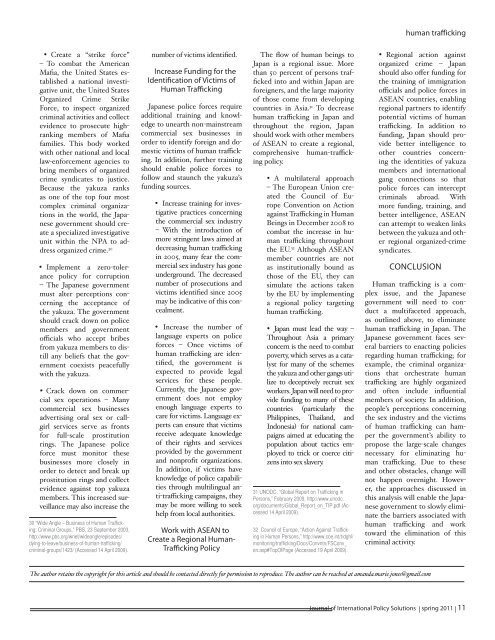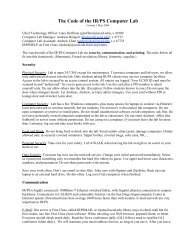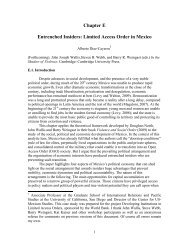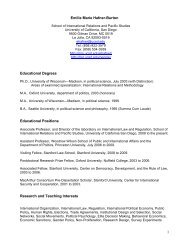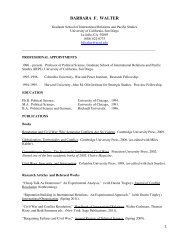to download the full journal. (1.2MB PDF) - School of International ...
to download the full journal. (1.2MB PDF) - School of International ...
to download the full journal. (1.2MB PDF) - School of International ...
You also want an ePaper? Increase the reach of your titles
YUMPU automatically turns print PDFs into web optimized ePapers that Google loves.
human trafficking<br />
• Create a “strike force”<br />
– To combat <strong>the</strong> American<br />
Mafia, <strong>the</strong> United States established<br />
a national investigative<br />
unit, <strong>the</strong> United States<br />
Organized Crime Strike<br />
Force, <strong>to</strong> inspect organized<br />
criminal activities and collect<br />
evidence <strong>to</strong> prosecute highranking<br />
members <strong>of</strong> Mafia<br />
families. This body worked<br />
with o<strong>the</strong>r national and local<br />
law-enforcement agencies <strong>to</strong><br />
bring members <strong>of</strong> organized<br />
crime syndicates <strong>to</strong> justice.<br />
Because <strong>the</strong> yakuza ranks<br />
as one <strong>of</strong> <strong>the</strong> <strong>to</strong>p four most<br />
complex criminal organizations<br />
in <strong>the</strong> world, <strong>the</strong> Japanese<br />
government should create<br />
a specialized investigative<br />
unit within <strong>the</strong> NPA <strong>to</strong> address<br />
organized crime. 30<br />
• Implement a zero-<strong>to</strong>lerance<br />
policy for corruption<br />
– The Japanese government<br />
must alter perceptions concerning<br />
<strong>the</strong> acceptance <strong>of</strong><br />
<strong>the</strong> yakuza. The government<br />
should crack down on police<br />
members and government<br />
<strong>of</strong>ficials who accept bribes<br />
from yakuza members <strong>to</strong> distill<br />
any beliefs that <strong>the</strong> government<br />
coexists peace<strong>full</strong>y<br />
with <strong>the</strong> yakuza.<br />
• Crack down on commercial<br />
sex operations – Many<br />
commercial sex businesses<br />
advertising oral sex or callgirl<br />
services serve as fronts<br />
for <strong>full</strong>-scale prostitution<br />
rings. The Japanese police<br />
force must moni<strong>to</strong>r <strong>the</strong>se<br />
businesses more closely in<br />
order <strong>to</strong> detect and break up<br />
prostitution rings and collect<br />
evidence against <strong>to</strong>p yakuza<br />
members. This increased surveillance<br />
may also increase <strong>the</strong><br />
30 “Wide Angle – Business <strong>of</strong> Human Trafficking:<br />
Criminal Groups,” PBS, 23 September 2003,<br />
http://www.pbs.org/wnet/wideangle/episodes/<br />
dying-<strong>to</strong>-leave/business-<strong>of</strong>-human-trafficking/<br />
criminal-groups/1423/ (Accessed 14 April 2009).<br />
number <strong>of</strong> victims identified.<br />
Increase Funding for <strong>the</strong><br />
Identification <strong>of</strong> Victims <strong>of</strong><br />
Human Trafficking<br />
Japanese police forces require<br />
additional training and knowledge<br />
<strong>to</strong> unearth non-mainstream<br />
commercial sex businesses in<br />
order <strong>to</strong> identify foreign and domestic<br />
victims <strong>of</strong> human trafficking.<br />
In addition, fur<strong>the</strong>r training<br />
should enable police forces <strong>to</strong><br />
follow and staunch <strong>the</strong> yakuza’s<br />
funding sources.<br />
• Increase training for investigative<br />
practices concerning<br />
<strong>the</strong> commercial sex industry<br />
– With <strong>the</strong> introduction <strong>of</strong><br />
more stringent laws aimed at<br />
decreasing human trafficking<br />
in 2005, many fear <strong>the</strong> commercial<br />
sex industry has gone<br />
underground. The decreased<br />
number <strong>of</strong> prosecutions and<br />
victims identified since 2005<br />
may be indicative <strong>of</strong> this concealment.<br />
• Increase <strong>the</strong> number <strong>of</strong><br />
language experts on police<br />
forces – Once victims <strong>of</strong><br />
human trafficking are identified,<br />
<strong>the</strong> government is<br />
expected <strong>to</strong> provide legal<br />
services for <strong>the</strong>se people.<br />
Currently, <strong>the</strong> Japanese government<br />
does not employ<br />
enough language experts <strong>to</strong><br />
care for victims. Language experts<br />
can ensure that victims<br />
receive adequate knowledge<br />
<strong>of</strong> <strong>the</strong>ir rights and services<br />
provided by <strong>the</strong> government<br />
and nonpr<strong>of</strong>it organizations.<br />
In addition, if victims have<br />
knowledge <strong>of</strong> police capabilities<br />
through multilingual anti-trafficking<br />
campaigns, <strong>the</strong>y<br />
may be more willing <strong>to</strong> seek<br />
help from local authorities.<br />
Work with ASEAN <strong>to</strong><br />
Create a Regional Human-<br />
Trafficking Policy<br />
The flow <strong>of</strong> human beings <strong>to</strong><br />
Japan is a regional issue. More<br />
than 50 percent <strong>of</strong> persons trafficked<br />
in<strong>to</strong> and within Japan are<br />
foreigners, and <strong>the</strong> large majority<br />
<strong>of</strong> those come from developing<br />
countries in Asia. 31 To decrease<br />
human trafficking in Japan and<br />
throughout <strong>the</strong> region, Japan<br />
should work with o<strong>the</strong>r members<br />
<strong>of</strong> ASEAN <strong>to</strong> create a regional,<br />
comprehensive human-trafficking<br />
policy.<br />
• A multilateral approach<br />
– The European Union created<br />
<strong>the</strong> Council <strong>of</strong> Europe<br />
Convention on Action<br />
against Trafficking in Human<br />
Beings in December 2008 <strong>to</strong><br />
combat <strong>the</strong> increase in human<br />
trafficking throughout<br />
<strong>the</strong> EU. 32 Although ASEAN<br />
member countries are not<br />
as institutionally bound as<br />
those <strong>of</strong> <strong>the</strong> EU, <strong>the</strong>y can<br />
simulate <strong>the</strong> actions taken<br />
by <strong>the</strong> EU by implementing<br />
a regional policy targeting<br />
human trafficking.<br />
• Japan must lead <strong>the</strong> way –<br />
Throughout Asia a primary<br />
concern is <strong>the</strong> need <strong>to</strong> combat<br />
poverty, which serves as a catalyst<br />
for many <strong>of</strong> <strong>the</strong> schemes<br />
<strong>the</strong> yakuza and o<strong>the</strong>r gangs utilize<br />
<strong>to</strong> deceptively recruit sex<br />
workers. Japan will need <strong>to</strong> provide<br />
funding <strong>to</strong> many <strong>of</strong> <strong>the</strong>se<br />
countries (particularly <strong>the</strong><br />
Philippines, Thailand, and<br />
Indonesia) for national campaigns<br />
aimed at educating <strong>the</strong><br />
population about tactics employed<br />
<strong>to</strong> trick or coerce citizens<br />
in<strong>to</strong> sex slavery.<br />
31 UNODC, “Global Report on Trafficking in<br />
Persons,” February 2009, http://www.unodc.<br />
org/documents/Global_Report_on_TIP.pdf (Accessed<br />
14 April 2009).<br />
32 Council <strong>of</strong> Europe, “Action Against Trafficking<br />
in Human Persons,” http://www.coe.int/t/dghl/<br />
moni<strong>to</strong>ring/trafficking/Docs/Convntn/FSConv_<br />
en.asp#TopOfPage (Accessed 19 April 2009).<br />
• Regional action against<br />
organized crime – Japan<br />
should also <strong>of</strong>fer funding for<br />
<strong>the</strong> training <strong>of</strong> immigration<br />
<strong>of</strong>ficials and police forces in<br />
ASEAN countries, enabling<br />
regional partners <strong>to</strong> identify<br />
potential victims <strong>of</strong> human<br />
trafficking. In addition <strong>to</strong><br />
funding, Japan should provide<br />
better intelligence <strong>to</strong><br />
o<strong>the</strong>r countries concerning<br />
<strong>the</strong> identities <strong>of</strong> yakuza<br />
members and international<br />
gang connections so that<br />
police forces can intercept<br />
criminals abroad. With<br />
more funding, training, and<br />
better intelligence, ASEAN<br />
can attempt <strong>to</strong> weaken links<br />
between <strong>the</strong> yakuza and o<strong>the</strong>r<br />
regional organized-crime<br />
syndicates.<br />
CONCLUSION<br />
Human trafficking is a complex<br />
issue, and <strong>the</strong> Japanese<br />
government will need <strong>to</strong> conduct<br />
a multifaceted approach,<br />
as outlined above, <strong>to</strong> eliminate<br />
human trafficking in Japan. The<br />
Japanese government faces several<br />
barriers <strong>to</strong> enacting policies<br />
regarding human trafficking; for<br />
example, <strong>the</strong> criminal organizations<br />
that orchestrate human<br />
trafficking are highly organized<br />
and <strong>of</strong>ten include influential<br />
members <strong>of</strong> society. In addition,<br />
people’s perceptions concerning<br />
<strong>the</strong> sex industry and <strong>the</strong> victims<br />
<strong>of</strong> human trafficking can hamper<br />
<strong>the</strong> government’s ability <strong>to</strong><br />
propose <strong>the</strong> large-scale changes<br />
necessary for eliminating human<br />
trafficking. Due <strong>to</strong> <strong>the</strong>se<br />
and o<strong>the</strong>r obstacles, change will<br />
not happen overnight. However,<br />
<strong>the</strong> approaches discussed in<br />
this analysis will enable <strong>the</strong> Japanese<br />
government <strong>to</strong> slowly eliminate<br />
<strong>the</strong> barriers associated with<br />
human trafficking and work<br />
<strong>to</strong>ward <strong>the</strong> elimination <strong>of</strong> this<br />
criminal activity.<br />
The author retains <strong>the</strong> copyright for this article and should be contacted directly for permission <strong>to</strong> reproduce. The author can be reached at amanda.marie.jones@gmail.com<br />
Journal <strong>of</strong> <strong>International</strong> Policy Solutions | spring 2011 | 11


